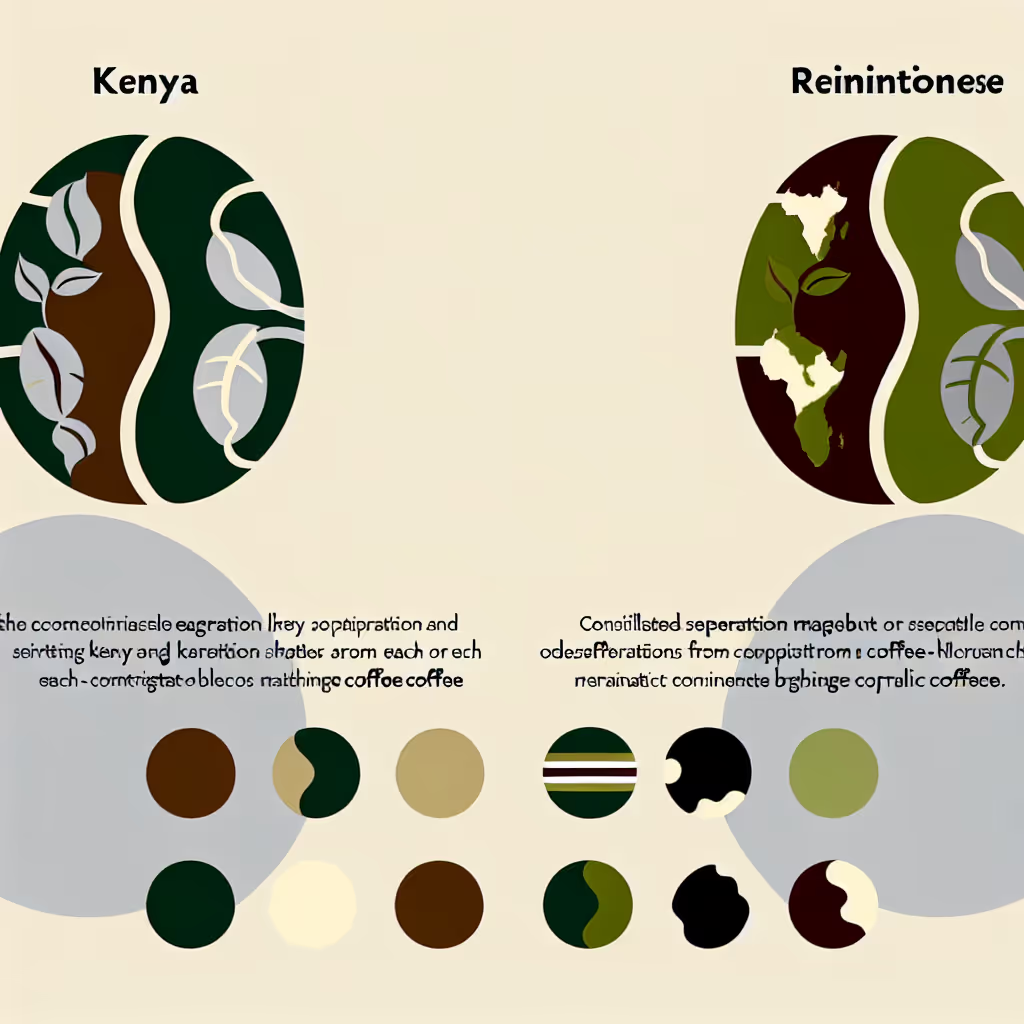Kenyan Vs. Puerto Rican Coffee
This comparison explores the distinct qualities of Kenyan and Puerto Rican coffees, examining their flavor profiles, growing conditions, and cultural significance to help coffee enthusiasts make informed choices.

Brief Description
Kenyan coffee is renowned for its bright acidity, full body, and complex flavor profile. Grown in the rich volcanic soils of the Central Highlands, these beans benefit from ideal climate conditions and meticulous processing. The result is a cup that's bold, wine-like, and often described as the 'connoisseur's choice'. With notes ranging from blackcurrant to citrus, Kenyan coffee offers a truly unique and memorable tasting experience.
Puerto Rican coffee, grown in the lush Central Mountain Range, is a hidden gem in the coffee world. Known for its smooth, well-balanced profile, it offers a unique taste experience that reflects the island's rich cultural heritage. The coffee plants thrive in the region's ideal microclimate, benefiting from volcanic soil and consistent rainfall. Puerto Rican coffee is often described as having a mild acidity with a full body, making it a perfect choice for those who appreciate a refined, yet bold cup.
Importance of Comparison
Comparing Kenyan and Puerto Rican coffee origins is crucial for coffee lovers seeking to expand their palate and understand the nuances of single-origin beans. These two regions offer vastly different flavor experiences, reflecting their unique terroirs and processing methods. By exploring these differences, consumers can better appreciate the diversity of coffee flavors and make more informed purchasing decisions.
Key Attributes
Origin
Kenyan
Puerto Rican


Consumer Guide
When choosing between Kenyan and Puerto Rican coffee, consider your flavor preferences. Kenyan coffee is known for its bright acidity and complex profile with notes of blackcurrant, citrus, and floral undertones. It's ideal for those who enjoy a bold, wine-like cup. Puerto Rican coffee offers a smoother, well-balanced experience with chocolate, nutty, and subtle citrus notes. It's perfect for those who prefer a milder, yet full-bodied brew. Consider the brewing method as well; both origins excel in pour-over and French press, but Kenyan shines in cold brew, while Puerto Rican is great for espresso. Lastly, think about the coffee's origin story and production scale – Kenyan coffee is more widely available, while Puerto Rican coffee offers a taste of the island's rich heritage.
Expert Opinions
Coffee expert Maria Rodriguez notes, 'Kenyan coffee's bright acidity and complex flavor make it a favorite among connoisseurs, while Puerto Rican coffee's smooth, balanced profile offers a more approachable experience.' Roastmaster John Smith adds, 'The difference in altitude and processing methods between these origins significantly impacts their taste. Kenyan coffee's higher altitude and double fermentation contribute to its distinctive flavor, while Puerto Rican coffee's lower altitude and varied processing methods result in a more nuanced cup.'
FAQs
Kenyan coffee is known for its bright acidity, full body, and complex flavor profile with notes of blackcurrant, citrus, and floral undertones. Puerto Rican coffee offers a smoother, well-balanced taste with chocolate, nutty, and subtle citrus notes. Kenyan coffee tends to be bolder and more wine-like, while Puerto Rican coffee is milder yet full-bodied.
Kenyan coffee is typically grown at higher altitudes (1400-2100m) in the volcanic soils of the Central Highlands, benefiting from ideal climate conditions. Puerto Rican coffee is grown at lower altitudes (600-1200m) in the Central Mountain Range, thriving in a unique microclimate with volcanic soil and consistent rainfall. These differences in growing conditions contribute to the distinct flavor profiles of each origin.
Both Kenyan and Puerto Rican coffees excel in pour-over and French press methods. However, Kenyan coffee is particularly well-suited for cold brew, which can highlight its bright, complex flavors. Puerto Rican coffee shines in espresso preparations, where its smooth, balanced profile can be fully appreciated. Experiment with different brewing methods to find your preferred way of enjoying each origin.
Kenya produces significantly more coffee annually, with an output of around 50,000 metric tons. In contrast, Puerto Rico's annual coffee production is much smaller, at approximately 5,000 metric tons. This difference in scale affects availability and potentially price, with Kenyan coffee being more widely accessible in the global market.
Kenyan coffee is typically processed using the washed method, often with a unique double fermentation process, and then sun-dried. This contributes to its clean, bright flavor profile. Puerto Rican coffee processing is more varied, including washed, natural, and honey methods. This diversity in processing allows for a range of flavor expressions within Puerto Rican coffee.
Coffee plays a significant role in both cultures, but in different ways. In Kenya, coffee is primarily an export crop and a major contributor to the economy. In Puerto Rico, coffee has deep cultural roots, being an integral part of daily life and social interactions on the island. Puerto Rican coffee reflects the island's rich heritage, while Kenyan coffee is often seen as a premium product in the global market.
Conclusion
Kenyan and Puerto Rican coffees offer distinct and rewarding experiences for coffee enthusiasts. Kenyan coffee stands out with its bright acidity, complex flavor profile, and wine-like qualities, making it a favorite among connoisseurs. Puerto Rican coffee, with its smooth, well-balanced taste and rich cultural heritage, provides a unique and approachable option. When choosing between the two, consider your flavor preferences, brewing methods, and desire for either a bold, complex cup or a smooth, balanced experience. Both origins showcase the incredible diversity in the world of coffee and are worth exploring for any serious coffee lover.





